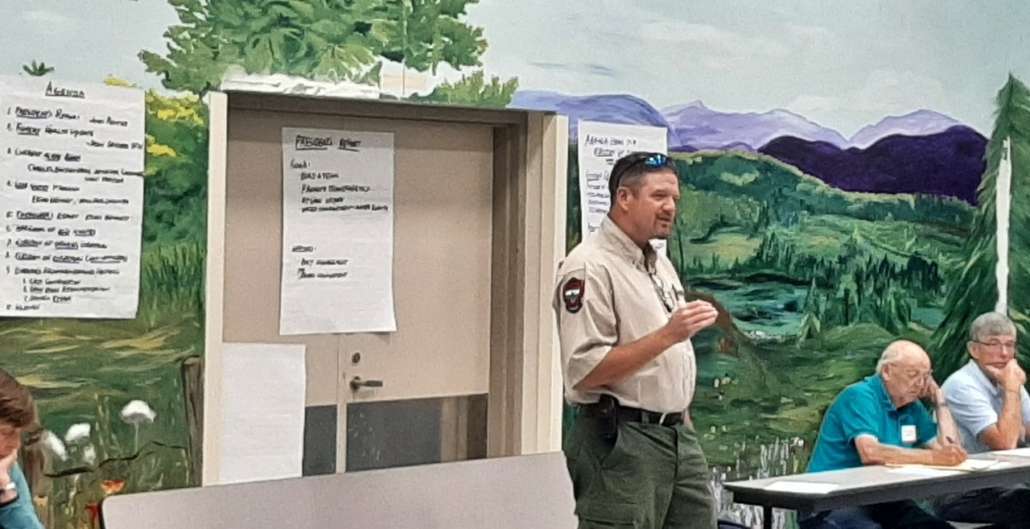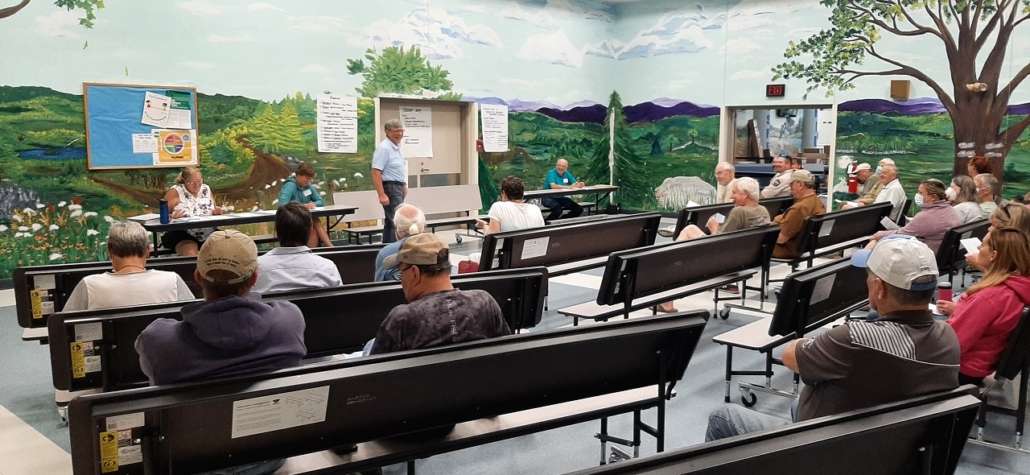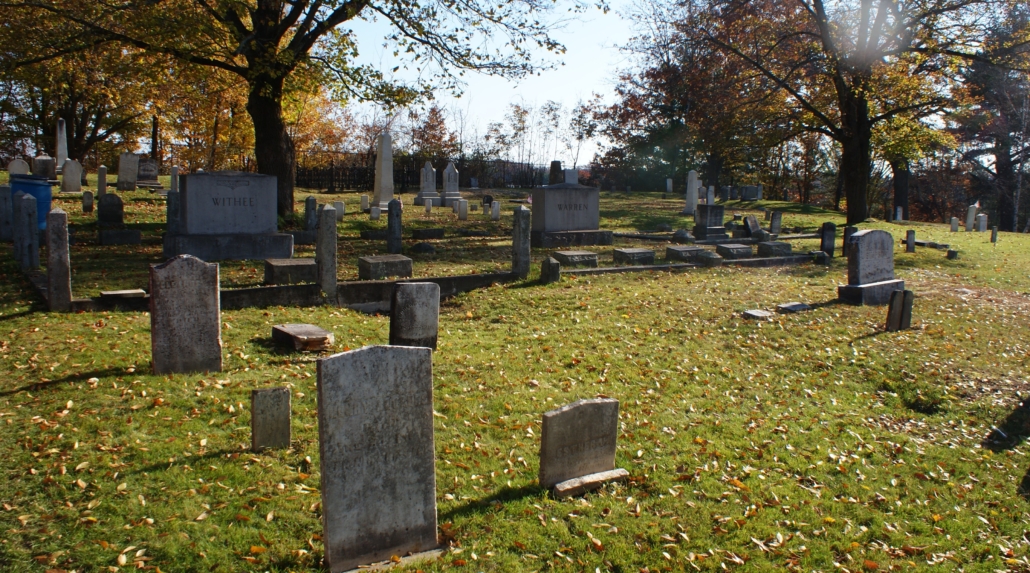At their Aug. 22 special meeting, China select board members approved seven substantive questions to be submitted to voters on Nov. 8. They postponed deciding whether to add an eighth question until their next regular meeting on Aug. 29.
The voting in November, on the state election day, is technically China’s annual town meeting, because local elections are held then. The annual spring meeting that includes approving the budget for the following year is labeled the town business meeting.
In addition to electing town officials (see box), unless select board members change their minds, voters on Nov. 8 will decide whether to approve:
- Appropriating $70,000 from federal American Rescue Plan Act (ARPA) funds toward expansion of broadband internet service in town (see The Town Line, Aug. 11, p. 3).
- Appropriating up to $21,590 in ARPA funds to reimburse China Rescue Unit’s reserve fund for an Automated External Defibrillator (AED) rescue personnel bought.
- Appropriating up to $7,000 in ARPA funds for improvements to the town’s radio tower at the town office, work that Town Manager Rebecca Hapgood said will improve reception for China Rescue and the public works department.
- Appropriating up to $22,000 to buy and install three heat pumps, one for the town office building and one each for the transfer station office and scale shack.
- Appropriating up to $75,000 – board members might adjust the amount – for a new senior citizens’ fuel assistance program, under guidelines board members still need to approve (see The Town Line, Aug. 11, p. 2).
- Appropriating up to $30,000 to repair fences around town cemeteries (see The Town Line, Aug. 18, p, 3).
- Amendments to China’s Quorum Ordinance.
The postponed question was whether to put on the ballot the planning board’s requested amendments to Chapters 2 and 11 of China’s Land Use Ordinance. Board member Wayne Chadwick asked for the delay because he was not sure what the proposed amendments say.
The amendments are posted on the town website, china.govoffice.org., and copies are available at the town office.
Select board members voted unanimously to recommend that voters approve six of the seven questions. The vote to put the amendments to the Quorum Ordinance on the Nov. 8 ballot was 3-2, with Blane Casey and Chairman Ronald Breton opposed and Chadwick, Jeanne Marquis and Janet Preston in favor.
The ordinance now sets the quorum for an open meeting (the pre-Covid type where residents gathered to vote by show of hands) at four percent of the registered voters as of the beginning of each year. Hapgood proposed amending it to make the requirement 100 registered voters.
The manager explained that under a new state law that automatically registers as a voter everyone who gets or renews a state driver’s license, China is gaining new voters every week – whether or not they intend to vote – and therefore the quorum requirement is increasing.
Hapgood is not happy with the thought that 100 residents can set policy for the town, and neither are select board members; but she reminded them that in past years, when the quorum was between 100 and 120 voters, meetings were delayed and even canceled for lack of attendees.
There is no plan to return to open meetings, Hapgood emphasized. She recommended the change because a written-ballot meeting requires, by state law, 90 days’ lead time, and there might be an emergency in which waiting almost three months for a voters’ decision would be harmful.
The senior citizens’ fuel fund was Chadwick’s idea. The purpose, he said, is to help seniors on fixed incomes adjust to dramatically increased fuel prices. At the board’s Aug. 1 meeting, Preston asked Hapgood to draft guidelines, which Chadwick said should be as simple as possible.
The preliminary version allocates $500 apiece next winter to applicants who are homeowners at least 65 years old and who have lived in town for at least a year, with an income cut-off (currently $30,000 for one person and $60,000 for a couple). LiHEAP (Low Income Home Energy Assistance Program) and HEAP recipients are not eligible.
Select board members propose approving final guidelines and perhaps amending the warrant article on Aug. 29.
The China Broadband Committee request for $70,000 in ARPA funds was discussed at length on Aug. 22. Jayne Sullivan and Michael Akers from UniTel, in Unity, and Daniel Parrish, from Idaho-based Direct Communications, joined select board members virtually, and local committee members attended in person.
The fund request is part of an estimated $1.2 million project that will be funded about 31 percent from China’s ARPA grant and TIF (Tax Increment Financing) fund – not from property taxes, Breton emphasized; a matching 31 percent from Direct/Unitel; and about 38 percent from state grants through the Maine Connectivity Authority (MCA) program.
If funding works out and the project goes through, Unitel would own and manage the system, meaning, Breton said approvingly, no new responsibilities for China staff.
Parrish said although the MCA program schedule is not yet established, he expects a first round of grant applications to be offered this fall. Direct Communications will prepare the application.
Parrish called the Nov. 8 local vote the next step in the process. Sullivan told Marquis UniTel will help explain the expansion program and funding to China voters. If China is denied a state grant, Parrish said, the project is not necessarily dead; possibilities include a smaller expansion with a larger Direct Communications contribution.
In addition to decisions on the Nov. 8 ballot, select board members approved re-contracting with Purdy Powers and Company to do the town audit and spending $16,408.06 in ARPA money for a portable digital speed sign. Voters approved up to $20,000 for the sign at the June 14 town business meeting.
The board’s Aug. 29 meeting is scheduled for 6:30 p.m. in the town office meeting room.
After the budget committee meeting, Hapgood said the budget committee will meet at 5:30 p.m., on Monday, August 29, to make recommendations on Nov, 8 proposed expenditures.
Declared candidates
As of Aug. 22, China Deputy Clerk Jennifer Chamberlain reported the following residents were circulating nomination papers for local elective office.
- For three seats on the select board, incumbents Ronald Breton and Janet Preston, plus Brent Chesley and Brian Ouellette Jr. Blane Casey is the other board member whose term ends this year; he said at the Aug. 22 meeting he is considering whether to seek another term.
- For the at-large position on the budget committee, incumbent Elizabeth Curtis. Also to be elected in 2022 are a secretary (Trishea Story is the incumbent) and representatives from District 2 (northeastern China, currently vacant) and District 4 (southwestern China; Timothy Basham is the incumbent).
- For one of China’s two representatives on the Regional School Unit #18 board, incumbent Dawn Castner, Wallace Pooler III and Darrell Stevens.
No one had taken out papers for any of the three planning board seats open in 2022. Incumbents are Toni Wall in District 2, Scott Rollins in District 4 and James Wilkens in the at-large (elected from anywhere in town) position.
China’s local elections will be Tuesday, Nov. 8. For candidates’ names to be on the ballot, signed nomination papers must be returned to the town office by the new closing time, 4:30 p.m., on Friday, Sept. 9.
 A new initiative from Efficiency Maine will further expand the coverage of the state’s electric vehicle (EV) charging infrastructure by supporting installation of public EV chargers in rural communities. This is the first of a series of planned EV charging infrastructure incentives from Efficiency Maine using $8 million allocated by Governor Mills’ Maine Jobs and Recovery Plan.
A new initiative from Efficiency Maine will further expand the coverage of the state’s electric vehicle (EV) charging infrastructure by supporting installation of public EV chargers in rural communities. This is the first of a series of planned EV charging infrastructure incentives from Efficiency Maine using $8 million allocated by Governor Mills’ Maine Jobs and Recovery Plan.






 by The Town Line staff
by The Town Line staff

